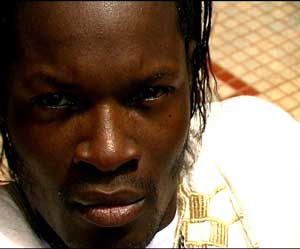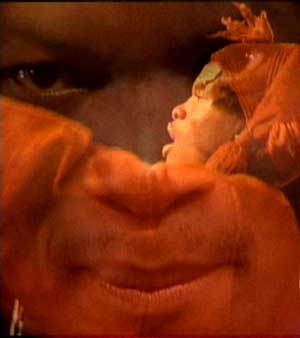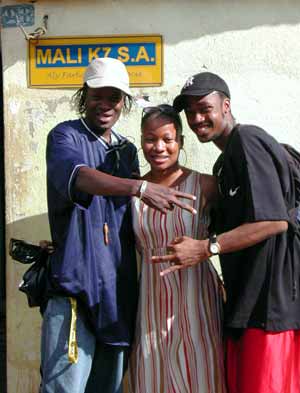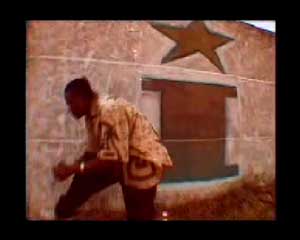|  Lassy
King Massassy, artist comedien Lassy
King Massassy, artist comedien
The advocate of the just causes
Do you
know the best rap album of the year in Mali? Do tire your brain because
it’s not in sale yet. “Niokala So” (the horse of wood)
is signed by LMK (Lassy
King Massassy). He’s a young rapper with scathing rhymes
and poignant messages.
According
to the Bambaras’ thoughts, the one who get on the back of this
horse to try to seduce people is wasting his time because he’s
mocking of himself. This philosophy explains the choice of the title
of the first solo album of Lassina Coulibaly/ Lassy
King Massassy (LKM). “Those
who think that the African peoples believe in their lies and demagogical
speeches are wrong” said the king to justify his choice;
a choice that very well represents the engagement of the young rapper.
Niokala So, an auto-produced album with about two millions of FCFA (3.048,00
€) is much more a pamphlet dipped into vitriol than a musical work
because the engagement exceeds the rappological revolt. Corruption,
demagogy, megalomania, misery, famine, privatization, religion, delinquency
are the menu of tracks like “Jamana Jô, Duwawu! Religion,
Fabara, Yèlèma, Babayo, Ananà min...”. Nobody
is spared. LKM reminds the youth that a
nation can not be built with the motto “laziness and weakness”.
He’s not gentle with the religious leaders who are preaching in
the political arena.
But the descendant of Biton Coulibaly is especially unable to stand
politicians. More than a revolt, "Fabara" strongly condemns
a class who made of Africa the cancer of the world. The youth adores
this engaged speech condemning the “fascist, macho, megalomaniac,
source of discord. You don’t care of us. It’s not the changing
of Congo Kinshasa’s name that will make it a nation favouring
speech and circulation liberty.“
 A
justified offensive because “in Africa, the governments are
having wonderful times. States of vicious and unfair laws with unlimited
mandate fighting for “Ivoirity” in order to eliminate the
opponents". Can we expect something else with “leaders
who have come out of the roads of neo-colonialism and imperialism; People
who have no brain and think that any governmental thing is theirs forever
and who sow in peoples the seeds of tribal and racial hate.” A
justified offensive because “in Africa, the governments are
having wonderful times. States of vicious and unfair laws with unlimited
mandate fighting for “Ivoirity” in order to eliminate the
opponents". Can we expect something else with “leaders
who have come out of the roads of neo-colonialism and imperialism; People
who have no brain and think that any governmental thing is theirs forever
and who sow in peoples the seeds of tribal and racial hate.”
Of course it’s difficult to diagnose the problems of Africa because
there is no “racial or tribal war in Africa, but political
short-sightedness of the despotic regimes , half civil…soldier
and leaders dealing like armed puppet used to kill to serve the boss…foreign
military forces that come on continents to stole the market of gold
and diamonds”.
Preaching in a desert? Do you want more?
So don’t miss Niokala so of Lassy King Massassy.
It will be soon on sale and it has all the ingredients to be the best
album of rap in Mali in 2003.
Niokala
So is an opus on which the messenger has invited his wife Aminata
Doumbia (chorus singer of Salif
Keïta), Tata Pound and
Fatoumata Diawara (heroine of the film
"Sya"). But the surprise is the duet with Salif
Keïta in "Anana min" (a remake of the nightingale’s
hymn). LMK did his best to have the maximum
of success. The result is wonderful. He couldn’t have done better
than that to mark his return after three years of absence.
 Lassy
is not unknown because he’s one of the forerunners of rap in Mali
with the band King Da Dia. The album of
this band was produced by Salif Keïta
and the promotion was also made in Europe by him. Lassy
is not unknown because he’s one of the forerunners of rap in Mali
with the band King Da Dia. The album of
this band was produced by Salif Keïta
and the promotion was also made in Europe by him.
It’s in France that the road of the different elements of the
band divided. “At the end of our tour, they preferred to stay
there. I’ve always thought that my destiny is in my country, my
inspiration comes from there. I want to be a reference for Malian youth.
It won’t be possible for me to know their problems if I stay in
Europe, so I came back home to serve my people and the youth”
he says. He then chose difficulty because France offered him more opportunities
of success than Mali. “I’m proud of being a Malian, an African.
I’m for integration and African union. This is why I’m proud
to see that my country is ready to leave a part or the totality of its
sovereignty for the realisation of the African union. It’s one
of the rare positive actions of the politicians” he explains.
Despite this strong engagement for the just causes, Lassy
is not a violent fellow. “I’m engaged since childhood.
It will be difficult for someone whose parents are wasting money to
stand on the microphone. It’s not the same case of the one who
has seen almost all kind of misery and is still confronted to revolting
situations. He knows how much people is suffering and knows what they
expect. He’s then the good one to defend them, denounce and demand”
he declared. The only thing he’s afraid of is to be preaching
in a desert. “One day, when I was listening to my songs with
my grand mother, she said to me: “Lassy, you’re right in
your engagement but I’m afraid it won’t change anything.
People will just admire you but no one will act”. A pertinent
analyse coming from an old woman who’s not an intellectual …
I’m afraid she’s right”.
 This artist has a vocational training certificate of building drawing
and a certificate in English and Bamanan (national language). He had
already taught during five years in an experimental school in Kati.
It’s an experience that has increased his analysing capacities.
This artist has a vocational training certificate of building drawing
and a certificate in English and Bamanan (national language). He had
already taught during five years in an experimental school in Kati.
It’s an experience that has increased his analysing capacities.
We then understand the pedagogy present in his very engaged compositions.
LKM is at the same time a teacher, a rapper
and a comedian; those who have seen "Sékou Fasa" and
"Le retour de Bougouniery" already know it.
In this play, he interprets the role of a young rapper who wants to
conquer the heart of a spoilt girl. He’s not unperceived at all
near confirmed comedians such as Diarrah Sanogo "Bougouniery",
Hamadoun Kassogué... one experience more for a young comedian
who has almost find his way. “Theatre allowed me to acquire
a scenic presence. In the past I was able to captivate fans of rap,
now I can keep the attention of any kind of public when I’m on
stage” confesses “Kini”
(that’s how his uncle in the play call him, he’s unable
to pronounce King)
And this first experience gave an idea to Lassy
who is now preparing a one man show as he’s ready to realise a
musical comedy if there is an occasion. Lassy
wants to be a comedian serving the people, the poor, the hopeless, the
oppressed, the unemployed… the ones the system forgot, and his
projects are as huge as his ambitions. King
is also very interested in the young people who are endangered by of
STI (sexual transmittable infections) and AIDS. “Before my
wedding, I used to make a test regularly. Even married, I go on doing
it with my wife who finds that totally normal. The indifference of the
youth comes from the fact that they are not informed enough. I used
to see huge billboards against sexual transmittable infections and AIDS
and I was happy but now, all of them are gone. The information campaign
about AIDS must be constant, until people say: We are fed up with hearing
about it” this is his opinion.
 The
King thinks that “Mali is the
peace nest of Africa” that must not give up the potentialities
of development. He doesn’t forget his wife Aminata
Doumbia "Mimi" who is
a chorus singer of Salif Keita;
in fact, he wants to produce the first album of his companion for life,
an album who is totally recorded and mixed. The
King thinks that “Mali is the
peace nest of Africa” that must not give up the potentialities
of development. He doesn’t forget his wife Aminata
Doumbia "Mimi" who is
a chorus singer of Salif Keita;
in fact, he wants to produce the first album of his companion for life,
an album who is totally recorded and mixed.
Awaiting the first steps of Mimi, Niokala
So will soon be on sales and the wish is that “Malians show
me that I’ve been a faithful messenger who fulfilled their expectations
and did not make a mistake on their preoccupations”.
So he reminds:“If the music lovers really want to support
me in my engagement, they must stop buying pirated tapes. Now it’s
very easy to identify legal tapes because they have shining stickers
on the covers”. You don’t help a farmer by encouraging
thieves to steal his harvests. That’s normal.
Moussa
Bolly
Photos Victor Corolleur |

 Lassy
King Massassy, artist comedien
Lassy
King Massassy, artist comedien A
justified offensive because “in Africa, the governments are
having wonderful times. States of vicious and unfair laws with unlimited
mandate fighting for “Ivoirity” in order to eliminate the
opponents". Can we expect something else with “leaders
who have come out of the roads of neo-colonialism and imperialism; People
who have no brain and think that any governmental thing is theirs forever
and who sow in peoples the seeds of tribal and racial hate.”
A
justified offensive because “in Africa, the governments are
having wonderful times. States of vicious and unfair laws with unlimited
mandate fighting for “Ivoirity” in order to eliminate the
opponents". Can we expect something else with “leaders
who have come out of the roads of neo-colonialism and imperialism; People
who have no brain and think that any governmental thing is theirs forever
and who sow in peoples the seeds of tribal and racial hate.” Lassy
is not unknown because he’s one of the forerunners of rap in Mali
with the band King Da Dia. The album of
this band was produced by
Lassy
is not unknown because he’s one of the forerunners of rap in Mali
with the band King Da Dia. The album of
this band was produced by  This artist has a vocational training certificate of building drawing
and a certificate in English and Bamanan (national language). He had
already taught during five years in an experimental school in Kati.
It’s an experience that has increased his analysing capacities.
This artist has a vocational training certificate of building drawing
and a certificate in English and Bamanan (national language). He had
already taught during five years in an experimental school in Kati.
It’s an experience that has increased his analysing capacities.
 The
King thinks that “Mali is the
peace nest of Africa” that must not give up the potentialities
of development. He doesn’t forget his wife Aminata
Doumbia "Mimi" who is
a chorus singer of
The
King thinks that “Mali is the
peace nest of Africa” that must not give up the potentialities
of development. He doesn’t forget his wife Aminata
Doumbia "Mimi" who is
a chorus singer of